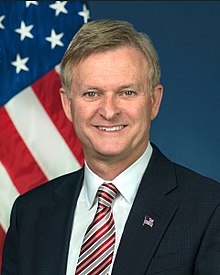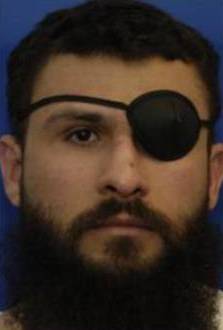
Abu Zubaydah is a Palestinian citizen and alleged terrorist born in Saudi Arabia currently held by the U.S. in the Guantanamo Bay detention camp in Cuba. He is held under the authority of Authorization for Use of Military Force Against Terrorists (AUMF).

Waterboarding is a form of torture in which water is poured over a cloth covering the face and breathing passages of an immobilized captive, causing the person to experience the sensation of drowning. In the most common method of waterboarding, the captive's face is covered with cloth or some other thin material and immobilized on their back at an incline of 10 to 20 degrees. Torturers pour water onto the face over the breathing passages, causing an almost immediate gag reflex and creating a drowning sensation for the captive. Normally, water is poured intermittently to prevent death; however, if the water is poured uninterruptedly it will lead to death by asphyxia. Waterboarding can cause extreme pain, damage to lungs, brain damage from oxygen deprivation, other physical injuries including broken bones due to struggling against restraints, and lasting psychological damage. Adverse physical effects can last for months, and psychological effects for years. The term "water board torture" appeared in press reports as early as 1976.

John Choon Yoo is a South Korean-born American legal scholar and former government official who serves as the Emanuel S. Heller Professor of Law at the University of California, Berkeley. Yoo became known for his legal opinions concerning executive power, warrantless wiretapping, and the Geneva Conventions while serving in the George W. Bush administration, during which he was the author of the controversial "Torture Memos" in the War on Terror.

The Office of Legal Counsel (OLC) is an office in the United States Department of Justice that assists the Attorney General's position as legal adviser to the President and all executive branch agencies. It drafts legal opinions of the Attorney General and provides its own written opinions and other advice in response to requests from the Counsel to the President, the various agencies of the Executive Branch, and other components of the Department of Justice. The Office reviews and comments on the constitutionality of pending legislation. The office reviews any executive orders and substantive proclamations for legality if the President proposes them. All proposed orders of the Attorney General and regulations that require the Attorney General's approval are reviewed. It also performs a variety of special assignments referred by the Attorney General or the Deputy Attorney General.
Extrajudicial prisoners of the United States, in the context of the early twenty-first century War on Terrorism, refers to foreign nationals the United States detains outside of the legal process required within United States legal jurisdiction. In this context, the U.S. government is maintaining torture centers, called black sites, operated by both known and secret intelligence agencies. Such black sites were later confirmed by reports from journalists, investigations, and from men who had been imprisoned and tortured there, and later released after being tortured until the CIA was comfortable they had done nothing wrong, and had nothing to hide.

Jay Scott Bybee is an American lawyer and jurist serving as a senior U.S. circuit judge of the Court of Appeals for the Ninth Circuit. He has published numerous articles in law journals and has taught as a senior fellow in constitutional law at William S. Boyd School of Law. His primary research interests are in constitutional and administrative law.

Alberto José Mora is a former General Counsel of the Navy. He led an effort within the Defense Department to oppose the legal theories of John Yoo and to try to end the use of torture at Guantanamo Bay.
"Enhanced interrogation techniques" or "enhanced interrogation" was a program of systematic torture of detainees by the Central Intelligence Agency (CIA), the Defense Intelligence Agency (DIA) and various components of the U.S. Armed Forces at remote sites around the world—including Bagram, Guantanamo Bay, Abu Ghraib, and Bucharest—authorized by officials of the George W. Bush administration. Methods used included beating, binding in contorted stress positions, hooding, subjection to deafening noise, sleep disruption, sleep deprivation to the point of hallucination, deprivation of food, drink, and medical care for wounds, as well as waterboarding, walling, sexual humiliation, rape, sexual assault, subjection to extreme heat or extreme cold, and confinement in small coffin-like boxes. A Guantanamo inmate's drawings of some of these tortures, to which he himself was subjected, were published in The New York Times. Some of these techniques fall under the category known as "white room torture". Several detainees endured medically unnecessary "rectal rehydration", "rectal fluid resuscitation", and "rectal feeding". In addition to brutalizing detainees, there were threats to their families such as threats to harm children, and threats to sexually abuse or to cut the throat of detainees' mothers.

Patrick F. Philbin is an American lawyer who served as Deputy Counsel to the President and Deputy Assistant to the President in the Office of White House Counsel in the Donald J. Trump administration. He previously served in the Department of Justice during the George W. Bush administration.
Daniel Bernard Levin served as Acting Assistant Attorney General for the Office of Legal Counsel of the U.S. Justice Department from July 2004 until February 2005. He is notable for having upheld legal opinions during the Bush administration that narrowly defined torture and authorized enhanced interrogation techniques. These opinions were mostly secret during this period, but rumors of abuse of prisoners were widespread, particularly after the 2004 Abu Ghraib prisoner torture and abuse scandal in Iraq. These opinions were repudiated in 2009 by the Obama administration.
The CIA interrogation videotapes destruction occurred on November 9, 2005. The videotapes were made by the United States Central Intelligence Agency (CIA) during interrogations of Al-Qaeda suspects Abu Zubaydah and Abd al-Rahim al-Nashiri in 2002 at a CIA black site prison in Thailand. Ninety tapes were made of Zubaydah and two of al-Nashiri. Twelve tapes depict interrogations using "enhanced interrogation techniques", a euphemism for torture. The tapes and their destruction became public knowledge in December 2007. A criminal investigation by a Department of Justice special prosecutor, John Durham, decided in 2010 to not file any criminal charges related to destroying the videotapes.
Walling is a method of torture used by the CIA in which a person's neck is encircled by a collar, and is then used to slam the person against a wall. According to information gathered by the International Committee of the Red Cross from six detainees, "walling" meant "beating by use of a collar", in at least one instance against a concrete wall.
Dawn Elizabeth Johnsen is an American lawyer and the Walter W. Foskett Professor of Constitutional law, on the faculty at Maurer School of Law at Indiana University in Bloomington, Indiana. She previously served in the Biden administration as Acting Attorney General at the Office of Legal Counsel, having been appointed on January 20, 2021 by President Joe Biden, to return to the role she previously held in the Clinton administration. She was succeeded in that role in a permanent capacity by Christopher H. Schroeder, and is currently serving as the Principal Deputy Assistant Attorney General in the same office
Robert J. Delahunty is an American legal scholar. He is a professor at the University of St. Thomas School of Law in Minneapolis, Minnesota. From 1989 to 2003, he worked in the Office of Legal Counsel. During his tenure there, he cowrote several legal opinions with John Yoo relating to interrogation, detention, and rendition of terror suspects.
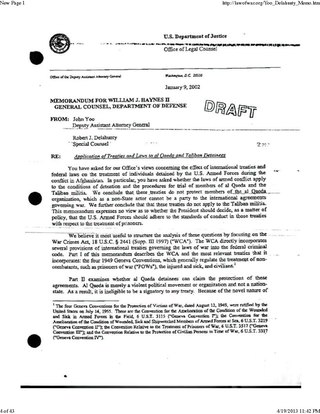
A set of legal memoranda known as the "Torture Memos" were drafted by John Yoo as Deputy Assistant Attorney General of the United States and signed in August 2002 by Assistant Attorney General Jay S. Bybee, head of the Office of Legal Counsel of the United States Department of Justice. They advised the Central Intelligence Agency, the United States Department of Defense, and the President on the use of enhanced interrogation techniques—mental and physical torment and coercion such as prolonged sleep deprivation, binding in stress positions, and waterboarding—and stated that such acts, widely regarded as torture, might be legally permissible under an expansive interpretation of presidential authority during the "War on Terror".
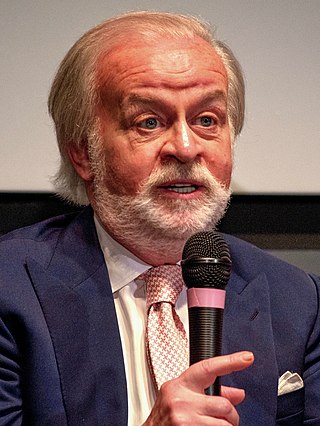
John Anthony Rizzo was an American attorney who worked as a lawyer in the Central Intelligence Agency for 34 years. He was the deputy counsel or acting general counsel of the CIA for the first nine years of the War on Terror, during which the CIA held dozens of detainees in black site prisons around the globe.
The Panetta Review was a secret internal review conducted by Leon Panetta, then the Director of the United States Central Intelligence Agency, of the CIA's torture of detainees during the administration of George W. Bush. The review led to a series of memoranda that, as of March 2014, remained classified. According to The New York Times, the memoranda "cast a particularly harsh light" on the Bush-era interrogation program, and people who have read them have said parts of the memos are "particularly scorching" of techniques such as waterboarding, which the memos describe as providing little valuable intelligence.
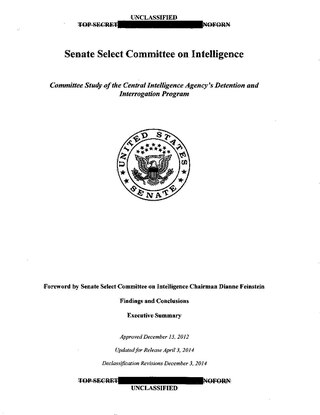
The Committee Study of the Central Intelligence Agency's Detention and Interrogation Program is a report compiled by the bipartisan United States Senate Select Committee on Intelligence (SSCI) about the Central Intelligence Agency (CIA)'s Detention and Interrogation Program and its use of torture during interrogation in U.S. government communiqués on detainees in CIA custody. The report covers CIA activities before, during, and after the "War on Terror". The initial report was approved on December 13, 2012, by a vote of 9–6, with seven Democrats, one Independent, and one Republican voting in favor of the report and six Republicans voting in opposition.

Steven Andrew Engel is an American lawyer. He served as the United States assistant attorney general for the Office of Legal Counsel in the Trump administration. Engel, who previously worked in the George W. Bush administration as deputy assistant attorney general in the Office of Legal Counsel, was nominated by President Donald Trump on January 31, 2017, and confirmed on November 7, 2017.
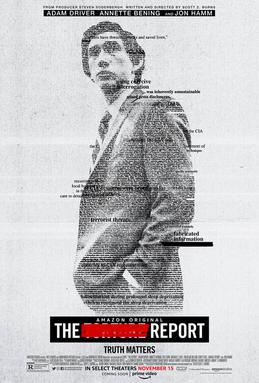
The Report is a 2019 American historical political drama film written and directed by Scott Z. Burns that stars Adam Driver, Annette Bening, Jon Hamm, Ted Levine, Michael C. Hall, Tim Blake Nelson, Corey Stoll, and Maura Tierney. It depicts the efforts of staffer Daniel Jones as he led the Senate Intelligence Committee's investigation of the Central Intelligence Agency's use of torture following the September 11th attacks, covering more than a decade's worth of real-life political intrigue related to the contents, creation, and release of the 6,700-page Senate Intelligence Committee report on CIA torture.
